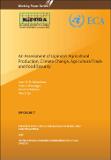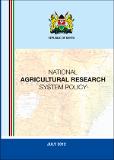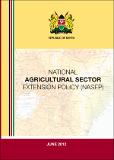| dc.date.accessioned | 2020-11-23T12:37:18Z | |
| dc.date.available | 2020-11-23T12:37:18Z | |
| dc.date.issued | 2017 | |
| dc.identifier.uri | http://repository.kippra.or.ke:8080/xmlui/handle/123456789/2113 | |
| dc.description.abstract | Recent research has demonstrated that climate change has potential impact on ecosystems globally, with enormous resultant effects on habitants. Evidence exists from observation over half a century demonstrating extreme change in climate with disasters leading to major losses. Changes in climate have led to changes in precipitation, length of growing seasons, water availability, carbon uptake, incidences of extreme weather events, flood risks, desertification, distribution and prevalence of human diseases and plant pests. These in turn have greatly impacted on agriculture and thus significantly altered the conditions for agricultural production especially in Africa. Uganda, like other countries, is likely to continue to experience increasing climate variability, which will lead to further decline in food production and hunger and thus limit the country’s ability to attain food security. Currently, there are inadequate policies developed to mitigate climate change impacts. Increasing agricultural production is crucial to securing food and more foreign exchange through trade. | en |
| dc.language.iso | en | en |
| dc.publisher | The Kenya Institute for Public Policy Research and Analysis (KIPPRA) | en |
| dc.relation.ispartofseries | WP/25/2017; | |
| dc.subject | Agricultural Production | en |
| dc.subject | Climate Change | en |
| dc.subject | Agricultural Trade | en |
| dc.subject | Food Security | en |
| dc.title | Working Paper No. 25 of 2017 on An Assessment of Uganda's Agricultural Production, Climate Change, Agricultural Trade and Food Security | en |
| dc.type | KIPPRA Publications | en |
| ppr.contributor.author | Shinyekwa, Isaac M. B ; Mwesigye, Francis ; Kuteesa, Annette & Ijjo, Alex T. | en |




